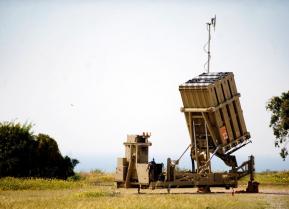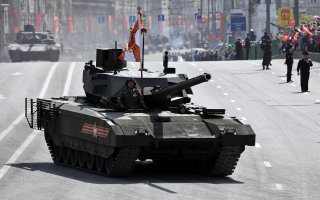How Will the Ukraine War End? When We Decide to Win It
The U.S. is in a global conflict. Part of this conflict is the Ukraine War, which will only end when we finally decide to win it, which means: recognizing the scope of the challenge, ramping up arms production, and committing to defeating–not appeasing–our enemies.
Several months ago, I was introduced online to a former Russian diplomat with whom I was able to conduct a conversation on Zoom. Our topic was supposed to be Middle East politics, but not surprisingly, we went right to the war in Ukraine. I had been connected to the diplomat by a mutual acquaintance who holds liberal views on international affairs, and I expected the same from my new interlocutor. It did not take long for me to discover how those expectations were misplaced.
In order to start out non-aggressively, looking for common ground, I began by asking what he would think of an “Austrian solution,” hearkening back to the 1955 treaty which ended the post-World War II occupation of Austria, guaranteed its national independence, and established the principle of permanent neutrality. Wouldn’t that work for Ukraine?
His reply was unambiguous: absolutely not. The Russian goal, he insisted, was to conquer all of Ukraine and put Zelensky and his collaborators on trial.
There is a lesson to draw from that encounter. While we in the West–in our think tanks, universities, and editorials–can be quite creative in designing compromises that would generously bargain away Ukraine’s territory, Russia–Ukraine’s adversary and ours–has shown no such inclination. We post-enlightenment liberals (one way or another) are inclined to look for exit strategies while the enemy plays to win.
This is the fundamental asymmetry of the moment. Unless the democracies overcome this aversion against the prospect of victory, the outcome will not be auspicious, and not only for Kyiv.
Not that long ago, one could envision a plausible end to the fighting in Ukraine with a return to the borders of February 24, 2022, a freezing of the conflict rather than a peace treaty, and continued ambiguity concerning Crimea. This would be far less than the legitimate goal of Ukraine to restore control over all its territory.
Still, there are limits to what Ukrainian forces can achieve without an acceleration of Western support. There has been too much foot-dragging in the delivery of weapons systems, especially in Washington and Berlin.
But that was then, and now, after the October 7 Hamas attack on Israel, geopolitics have shifted tectonically. Ukraine is no longer an isolated conflict. Ukraine and Israel alike face enemies sworn to their respective destruction, and both are supported by Iran. Both engage in systematic war crimes that are gruesomely identical. At stake ultimately is the collaboration of Russia and Iran, along with China and North Korea, to degrade American presence everywhere.
The U.S. is in a global conflict. Part of this conflict is the Ukraine War, which will only end when we finally decide to win it, which means recognizing the scope of the challenge, ramping up arms production, and committing to defeating–not appeasing–our enemies.
Russell A. Berman, the Walter A. Haas Professor in the Humanities at Stanford University, is a senior fellow at the Hoover Institution and a co-chair of the Working Group on Islamism and the International Order. At Stanford, he is a member of both the Department of German Studies and the Department of Comparative Literature at Stanford, and he specializes on politics and culture in Europe as well as in the Middle East. He has served in numerous administrative positions at Stanford, including as chair of the Senate of the Academic Council.


